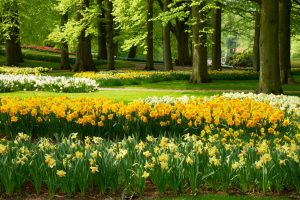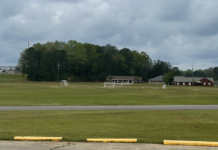
By Maggie Lawrence
AUBURN UNIVERSITY, Ala. – Nothing says spring more than blooming drifts of cheerful daffodils and other bulbs. However, to enjoy these spring bulbs, a horticulture professional with the Alabama Cooperative Extension System says October to late December is the time to plant here in Alabama.
Good Bulb Choices
Megan Jones, an Alabama Extension home grounds, gardens and home pests agent, said the first step is deciding which to plant.
“Daffodils or narcissus are favorites in the South because they thrive even in our warm winters,” Jones said. “Daffodils come in a huge variety of colors, flower sizes and shapes and mature plant sizes. There is a choice for every garden spot.”
She adds that other good choices include alliums, crocuses, Dutch iris and squills (Scilla varieties).
“While many people love tulips, people should be prepared to treat them as an annual and replant them every fall,” she said. “Alabama winters are not cold enough for tulips to rebloom. For best results, buy pre-chilled tulip bulbs and plant in late December through January.”
Buying and Storing Bulbs
When buying bulbs, check their firmness. Also, buy early to get the best selections available.
“Another consideration is bulb size,” Jones said. “Generally, the bigger the bulb is, the bigger the flower is.”
Keep bulbs cool until planting time. Chilling bulbs in the refrigerator is a good option, but do not store them near fruits which can release gases that reduce blooms. It is best to store bulbs in a mesh bag.
Planting
Jones said that most bulbs prefer growing conditions in acidic, nutrient-rich and well-draining soils that experience full to partial sun.
“Wet, soggy soils can cause bulbs to rot,” Jones said. “You may need to add organic matter to heavy clay soils. Even if you have a well draining sandy soil, adding additional organic material will increase the soil’s ability to hold water and nutrients.”
Jones said conducting a soil test to determine exactly what the plants need is always a good idea. County Extension offices can help gardeners with information on how to take a soil sample and submit it for analysis.
According to Jones, different bulbs require different planting depths.
“Consult the packaging information on your bulbs for specific depth,” she said. “A good rule of thumb is to plant the bulb in a hole three times as deep as the size of the bulb. Plant with the narrow end, or the nose, of the bulb pointing up.”
Cover planted bulbs with 2 to 3 inches of mulch. Mulch will help reduce soil compaction, regulate soil temperature, limit moisture loss and prevent weeds. Remember to water at planting to settle the soil and provide the right conditions for improved root development.
More Information
For more information about gardening, visit the Alabama Extension website, www.aces.edu.
















